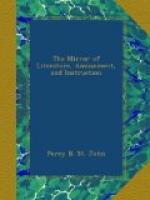The notion of prolonging life by inhaling the breath of young women, was an agreeable delusion easily credited: and one physician who had himself written on health, was so influenced by it, that he actually took lodgings in a boarding-school, that he might never be without a constant supply of the proper atmosphere. Philip Thicknesse, who wrote the “Valetudinarian’s Guide,” in 1779, seems to have taken a dose whenever he could. “I am myself,” says he, “turned of sixty, and in general, though I have lived in various climates, and suffered severely both in body and mind; yet having always partaken of the breath of young women, whenever they lay in the way, I feel none of the infirmities which so often strike the eyes and ears in this great city (Bath) of sickness, by men many years younger than myself.”
Wadd’s Memoirs.
* * * * *
FELLOW FEELING.
It is told of a certain worthy and wealthy citizen, who has acquired the reputation of being a considerable consumer of the good things of the table, and has been “widened at the expense of the corporation,” that on coming out of a tavern, after a turtle feast, a poor boy begged charity of him—“For mercy’s sake, sir, I am so very hungry!” “Hungry!—hungry!—hey!—what!—complain of being hungry!—why I never heard the like!—complain of being hungry!!—Prodigious!!!—why I’d give a guinea to be hungry!!!—why, a hungry man (with a good dinner before him) is the happiest fellow in the world!—There, (giving the boy half-a-crown,) there, I don’t want you to take my word for it: run along, my fine fellow, and make the experiment yourself.”—Dr. Kitchener.
* * * * *
ARCANA OF SCIENCE,
OR REMARKABLE FACTS AND DISCOVERIES IN NATURAL HISTORY, METEOROLOGY, CHEMISTRY, MINERALOGY, GEOLOGY, BOTANY, ZOOLOGY, PRACTICAL MECHANICS, STATISTICS, AND THE USEFUL ARTS.
* * * * *
[Under this head it is proposed, in the future numbers of the MIRROR, to assemble all new and remarkable facts in the several branches of science enumerated above. These selections will be made from the Philosophical Journals of the day, the Transactions of Public Societies, and the various Continental Journals. The advantages of such a division in accordance with the high and enlightened character of the present age, must be obvious to every reader of our miscellany. At the same time it will be our object to concentrate or condense from all other authentic sources such new facts in science as are connected with the arts of social life, and which from being scattered through elaborate and expensive works, might thereby be lost to some portion of our readers. In short, popular discoveries in science, or all such new facts as




